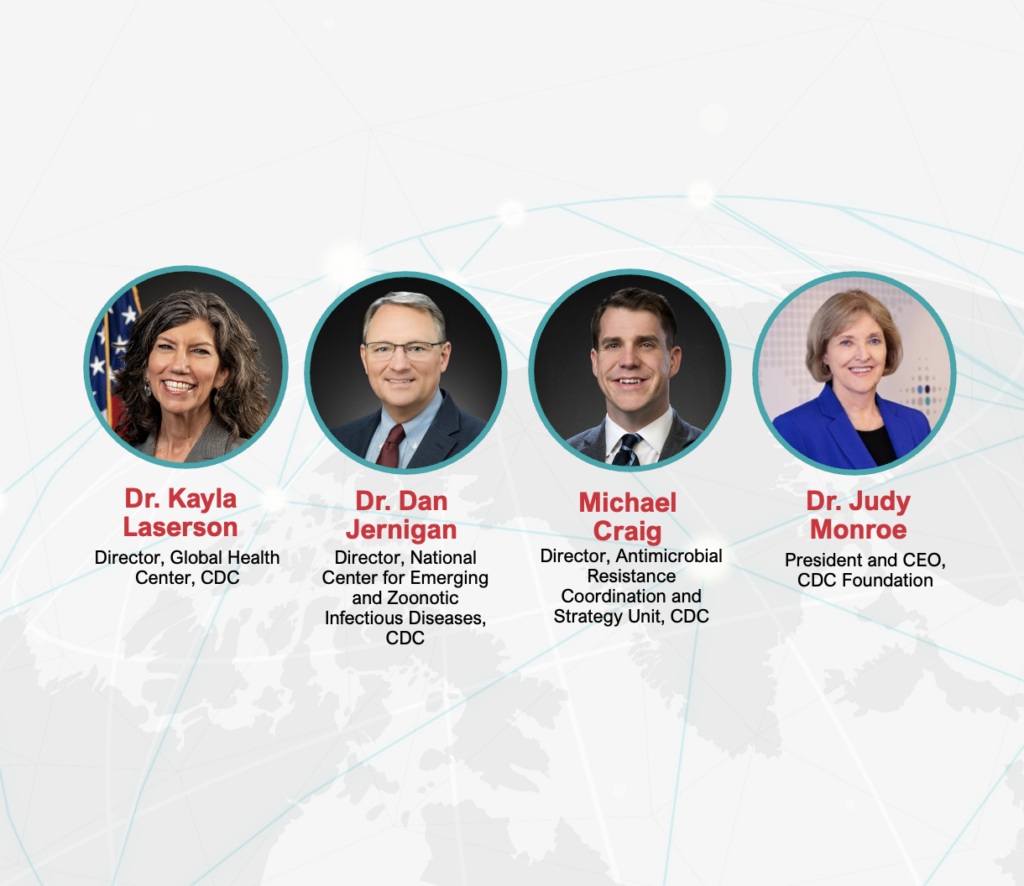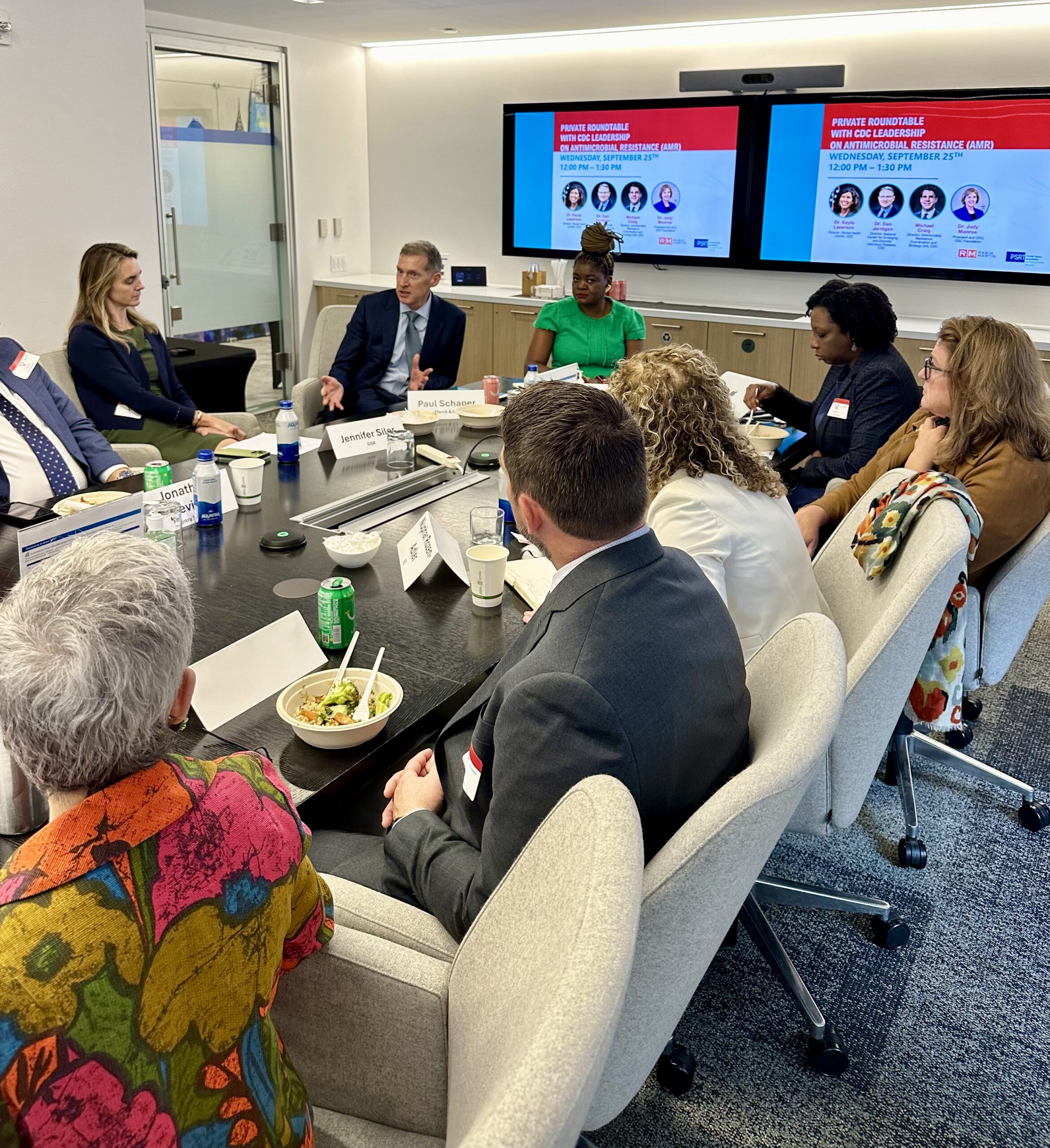A roundtable with CDC and CDC Foundation leadership hosted by the Private Sector Roundtable on Global Health Security (PSRT) and Rabin Martin
September 25, 2024 | New York, New York
The day before the UN High-Level Meeting on AMR and the adoption of the Political Declaration on AMR, leaders from CDC, the CDC Foundation, and over a dozen multinational companies convened to discuss the need for strengthened public-private partnerships to combat antimicrobial resistance.
Additional conversation topics included the importance of setting clear targets for addressing AMR, enhancing global surveillance, and building capacity to curb AMR across diverse health systems.
CDC’s broader efforts to build and strengthen six core capabilities that underpin global health work were also discussed: data and surveillance, lab, workforce, prevention and response, innovation and research, and policy, communications, and diplomacy.
PARTICIPANTS FROM CDC AND CDC FOUNDATION LEADERSHIP

Discussion Highlights
1.Opportunities for public/private partnership
CDC leaders expressed interest in increased private sector engagement in combating AMR, noting the value of collaboration with countries to help develop National Action Plans and establish metrics for lab systems. Companies involved in lab strengthening noted the lack of data sharing among labs as a barrier to these efforts. CDC acknowledged this problem and responded that they are working with global public health partners to facilitate data sharing.
Another area ripe for private sector involvement is innovation, especially around pathogen reduction.
2. The challenge of setting global targets
Setting appropriate, measurable targets for reducing morbidity and mortality due to AMR is challenging given the vast differences in healthcare systems around the world. While a welcome change in the 2024 Political Declaration on AMR (compared to the 2016 version) is the inclusion of targets for reducing mortality and improving infection prevention and control, there are less ambitious targets in other areas, such as regulatory systems for appropriate use of antimicrobials in humans and animals.
Participants highlighted the complexity in defining what constitutes an “appropriate use” target across diverse contexts, given wide variation in health systems and prescribing practices. The group agreed on the need for stewardship models tailored to local settings, with targets that are both meaningful and realistic to achieve.

3. Vaccination is a powerful tool to prevent infections and combat AMR
Vaccination is a critical but sometimes overlooked component of preventing infections and slowing the spread of AMR. CDC emphasized that increased vaccine use reduces antibiotic use, and fewer visits to health providers to treat vaccine-preventable illnesses lower the likelihood of an antibiotic being prescribed. CDC experts are starting new analyses on the return on investment of vaccination in the fight against AMR in order to strengthen the evidence base to make the case for vaccination as an essential AMR mitigation strategy.
4. Balancing access to antimicrobials with stewardship
One of the fundamental challenges in combating AMR is balancing equitable access to antimicrobials – which remains a major problem in low-income countries – with minimizing their overuse and inappropriate use. Strengthening local infection prevention and control programs, increasing vaccination coverage and improving practices around antibiotic use – such as tracking, accountability, reporting and education – are essential to mitigating the risk of AMR.
Conclusion
The roundtable provided a clear call to action for all stakeholders to deepen their involvement in combating AMR. By working together, the public and private sectors can set measurable goals, continue building lab capacity to identify antimicrobial-resistant pathogens, expand vaccination as a mitigation tool, and support context-specific solutions to balance antimicrobial access with antimicrobial stewardship.
13 companies represented
- AstraZeneca
- Becton Dickinson (BD)
- BioMérieux Inc.
- Cencora
- Cepheid
- Chevron
- GSK
- Henry Schein
- Illumina
- Johnson & Johnson
- Merck
- Roche
- Sanofi
Moving forward, the PSRT, Rabin Martin, CDC, and the CDC Foundation are committed to intensifying efforts to build collaboration between the private and public sectors to tackle AMR and other critical issues affecting global health security.
Rabin Martin serves as the secretariat for the PSRT, a coalition of companies from diverse industries committed to strengthening health security at the global, regional, national, and local levels. Interested in joining the PSRT? Please reach out to the PSRT Secretariat team to connect and share details about membership opportunities.